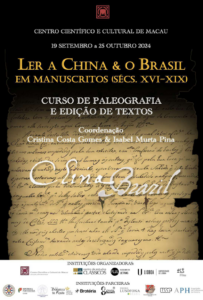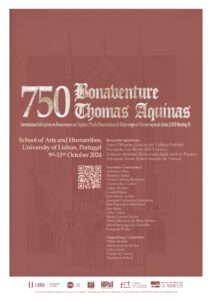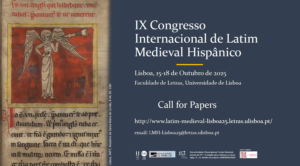No one is to be found who has nothing
attained from education.
Nemo reperitur qui sit studio nihil consecutus.
Quintilian, The Orator's Education 1.1.2
Navigation
Events organised by the centre
Seminars
No seminars at the moment.

Curso de Paleografia “Ler a China e o Brasil em manuscritos”
De 19 de Setembro a 25 de Outubro realiza-se o curso Ler a China e o Brasil em Manuscritos (Sécs. XVI-XIX). Curso de Paleografia e Edição de Textos, organizado conjuntamente pelo Centro de Estudos Clássicos da Universidade de Lisboa e o Centro Científico e Cultural de Macau. O curso terá um formado híbrido, decorrendo as aulas presenciais no Centro Científico e Cultural de Macau, e será coordenado por Cristina Costa Gomes e Isabel Murta Pina. O objectivo do curso é o de proporcionar a todos os interessados conhecimentos práticos de leitura paleográfica, transcrição e edição de textos dos séculos XVI a XIX.
START AND END DATE: 2024-09-19 / 2024-10-25
LOCATION: Centro Científico e Cultural de Macau
ORGANIZED BY: Ana Cristina Costa Gomes, Isabel Pina
PROGRAM: Open File

International Conference on Tacitus
Multus hinc ipso sermo de Tacito | Tacitus and the Paths of History
Tacitus is a widely known author but perhaps not studied as much as he deserves. Despite the general interest shown these last decades, there is still much to explore in his work.
In order to foster further investigation of Tacitus, and explore themes and issues that have not yet been fully investigated, the Centre for Classical Studies (CEC) and the Centre for History (CH) of the University of Lisbon are organizing an International Conference, which will take place between 26th and the 28th of November 2024.
Speakers are encouraged to employ philological, historical, political and anthropological approaches in their presentations
START AND END DATE: 2024-11-26 / 2024-11-28
LOCATION: School of Arts and Humanities – University of Lisbon
ORGANIZED BY: CEC, CHUL
INFORMATION AND REGISTRATIONS: tacitus@letras.ulisboa.pt
CALL FOR PAPERS: Open File

International Colloquium on Bonaventure and Aquinas
Studia Bonaventurae de Balneoregio et Thomae Aquinati oblata
SEHI Meeting III
2024 marks the 750th anniversary of the death of both Bonaventure of Bagnoregio and Thomas Aquinas. To commemorate the occasion, the Centre of Philosophy of the University of Lisbon (CFUL), in partnership with the Centre for Classical Studies of the same University (CEC) and the Society for the European History of Ideas (SEHI), is organizing a colloquium, which will take place between 9th and the 11th of October, 2024. The aim of the colloquium is to contribute to the renewal of the studies on these two prominent philosophers of the 13th century.
To this end, the organizers invite the submission of conference abstracts and panel proposals on one of the following topics:
- The philosophy of Bonaventure
- The philosophy of Thomas Aquinas
- Comparative studies between Bonaventure and Thomas Aquinas
- The influences of and on Bonaventure and/or Thomas Aquinas
- Bonaventure and/or Thomas Aquinas and the universities of the 13th century
- The presence of Bonaventure and/or Thomas Aquinas in present-day philosophy
*Update: After many requests, the CFP has been opened again and will exceptionally remain open until April 28, 2024. Anyone willing to submit an abstract should do so as soon as possible.*
START AND END DATE: 2024-10-09 / 2024-10-11
LOCATION: School of Arts and Humanities, University of Lisbon, Portugal
ORGANIZED BY: CEC, CFUL
PRICE: Registration fees (due until June 28, 2024): Student registration: 85€; Standard registration: 150€
INFORMATION AND REGISTRATIONS: 750bt@letras.ulisboa.pt https://cful.letras.ulisboa.pt/events/750bt
CALL FOR PAPERS: Open File
Call for Papers

IX Congresso Internacional de Latim Medieval Hispânico
Lisboa, 15-18 de Outubro de 2025
Desde 1993, a comunidade científica dedicada ao estudo dos autores e textos da latinidade hispânica medieval tem-se encontrado periodicamente para debater ideias e resultados. Os três primeiros congressos realizaram-se em León, sob a égide de D. Maurilio Pérez González, os seguintes em Lisboa, Barcelona, Alicante, Salamanca e Valladolid. Nestes encontros, são apresentados os resultados mais recentes do estudo sobre os textos e a cultura da Hispânia visigótica e alto-medieval nas suas mais variadas vertentes, e o seu lugar como receptora da tradição tardo-antiga. Vinte anos após a quarta edição, que teve lugar em Lisboa, o Centro de Estudos Clássicos da Universidade de Lisboa vem de novo organizar este evento, espaço privilegiado de encontro e troca de ideias e experiências entre especialistas.
Website: https://sites.google.com/view/ix-cilmh/home
START AND END DATE: / 2025-04-30
LOCATION: Faculdade de Letras da Universidade de Lisboa
PRICE: Preço de inscrição (com comunicação): 75 euros (50 euros para estudantes de doutoramento)
INFORMATION AND REGISTRATIONS: LMH-Lisboa25@letras.ulisboa.pt
Summer courses
No outreach events at the moment.
